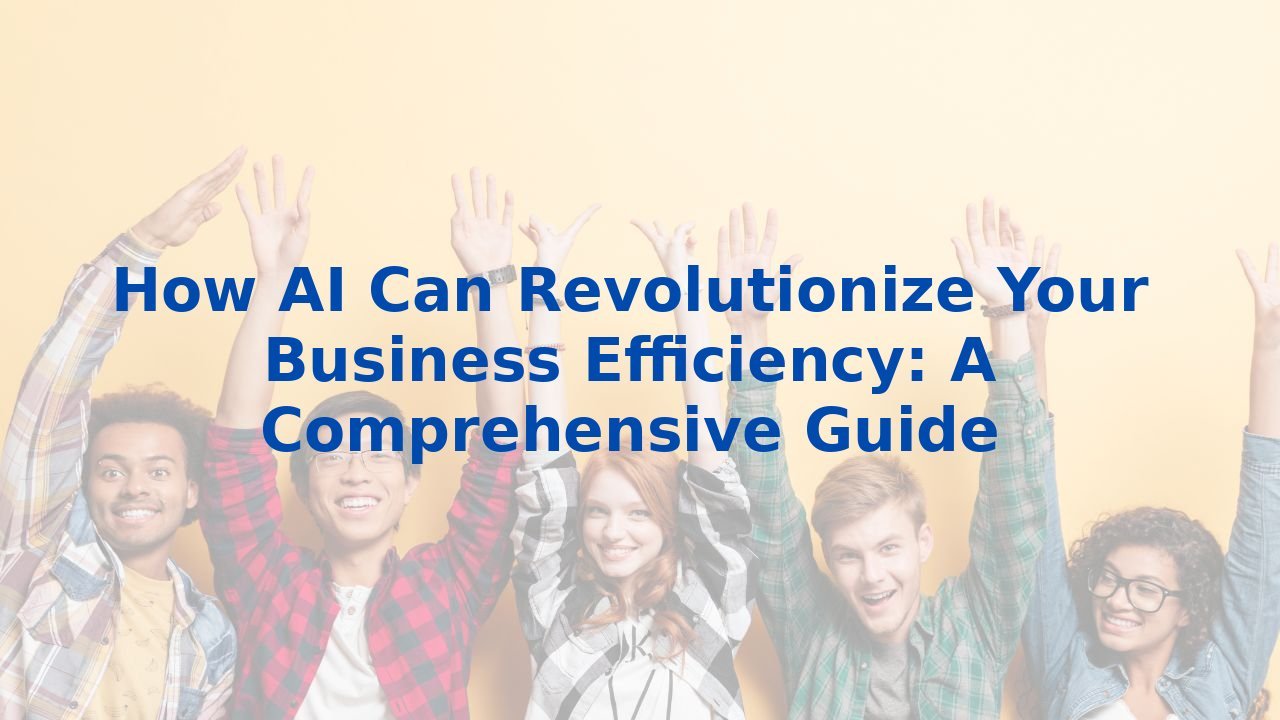How AI Can Revolutionize Your Business Efficiency: A Comprehensive Guide
How AI Can Revolutionize Your Business Efficiency: A Comprehensive Guide
In a world where competition grows fiercer by the day, businesses must adapt quickly to stay ahead. The integration of Artificial Intelligence (AI) is no longer just an option; it’s a necessity for organizations aiming to enhance efficiency and streamline operations. In this guide, we will explore how AI can fundamentally transform various business processes, driving productivity and fostering informed decision-making.
Understanding AI Process Optimization
At its core, AI process optimization involves leveraging machine learning and AI technologies to refine business process management. This encompasses analyzing vast data sets, automating repetitive tasks, and enhancing decision-making frameworks. The result? A significant reduction in errors and a notable improvement in operational efficiency.
Key Benefits of AI in Business Processes
Let’s dive into how AI can propel your business towards enhanced efficiency.
1. Automating Routine Tasks
Many businesses face the challenge of manual, high-volume tasks that consume significant resources. AI shines here by automating processes like document management. Intelligent Document Processing (IDP) can seamlessly convert physical documents into usable data with minimal human interjection, letting employees focus on strategic engagements.
2. Improving Decision Making
Imagine having access to predictive analytics that guide your business strategies. AI analyzes historical data to offer valuable insights and forecasts, enabling business leaders to make informed decisions that can impact profitability.
3. Enhancing Customer Service
AI revolutionizes customer service by analyzing feedback and connecting insights directly to actionable items. By processing customer inquiries and routing them intelligently, AI ensures that human agents handle the most critical issues, thereby improving the overall customer experience.
4. Streamlining Product Development
AI doesn’t just stop at optimizing existing processes; it transforms creative workflows, too. With generative design, teams can explore countless design alternatives that meet specific criteria, effectively accelerating the prototyping phase and cutting costs associated with trial and error.
5. Automating Content Generation
Organizations can leverage AI to produce quick, engaging content tailored for various platforms—from product descriptions to extensive articles. This efficiency reduces the content workload, allowing human writers to focus on high-impact projects.
6. Optimizing Sales and Marketing
AI tools enhance CRM systems by predicting customer behavior, enabling targeted marketing efforts that can yield greater revenue. Chatbots play a vital role here, engaging customers on-demand and resolving inquiries—thus elevating the sales process.
7. Improving Meetings
AI simplifies the administrative burden of meetings by scheduling appointments and capturing key discussion points automatically. This allows teams to invest time in meaningful dialogue rather than paperwork.
8. Enhancing HR Processes
With AI, HR departments can elevate their effectiveness, using data-driven insights to create competitive yet fair compensation packages. AI also aids in resolving complex queries faster than traditional systems.
The Integral Role of AI in Business Process Management
AI significantly enhances business process management through:
Data Analysis: AI's capabilities extend to sifting through extensive data, revealing trends and root causes to inform strategic decisions.
Process Building: By analyzing real-time and historical data, AI can develop new, efficient workflows that better serve business needs.
Automation: Automating manual tasks not only saves time but also enhances accuracy, an essential component of effective business operations.
Training Employees for AI
Introducing AI into your operations is just the beginning; maximizing its potential requires a well-trained workforce. Here’s why investing in employee training for AI is critical:
- Enhanced Productivity: Equipped with AI knowledge, employees streamline processes, reducing manual error and increasing output.
- Improved Decision Making: Trained employees can decode data-driven insights, empowering them to make judicious decisions in real-time.
- Adaptability: An agile use of AI technologies fosters resilience among employees, enabling organizations to pivot swiftly when market needs shift.
- Compliance: Training in AI ensures that workforce members understand and utilize these systems in a compliant manner, mitigating regulatory risks.
Conclusion
Integrating AI into your business processes opens a realm of possibilities—greater efficiency, reduced costs, improved decision-making, and ultimately, long-term success. However, the true power of AI comes alive when paired with a well-informed, engaged workforce. By training your employees to harness AI’s capabilities, you inspire a culture of innovation that thrives in our rapidly changing business landscape.
Ready to embrace the future? Learn more about how comprehensive AI training can empower your organization and transform your business practices for enduring success.



